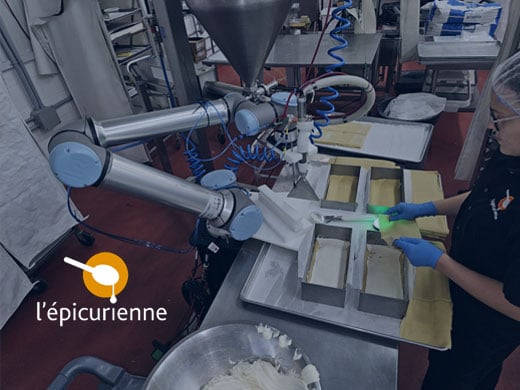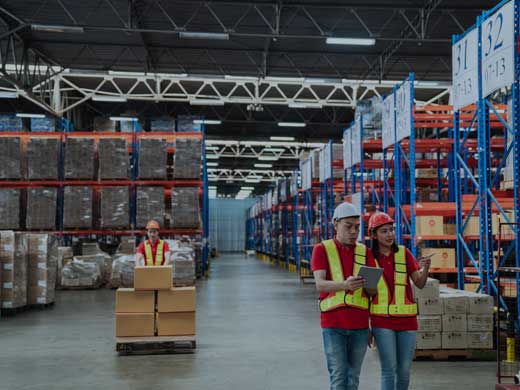L'épicurienne is a central kitchen supplying food products to restaurant chains such as Pacini, Café Morgane and others. Faced with the challenges of an outdated, manual management system, the company decided to undertake a digital transformation by implementing an ERP software to their food and beverage business. Discover the motivations behind this change, the challenges encountered, the process of selecting the new tool and the results obtained after its implementation.
The Business
L'épicurienne was founded in 2006 as Les Délices de l'Érable, a company created by the Citadelle group. The factory specialized in the production of desserts made from cranberries, honey and maple syrup. Later, it began subcontracting to restaurants. In 2020, Citadelle withdrew from the project, and l'épicurienne was founded to continue supplying the various customers. However, following the takeover, the ERP software used under Citadelle was no longer accessible, as it belonged to the former entity. This forced the team to work manually with Excel to manage recipes and ensure product traceability. This led to several major difficulties.
Challenges
The first issue concerned product traceability, which no longer met the standards required by the Canadian Food Inspection Agency (CFIA). Without a digital tracking system, managing product recalls was complicated and time-consuming, increasing the risk of non-compliance. In addition, manual data entry, particularly of batch numbers and raw materials, created a high risk of human error, compromising data reliability.
The absence of an integrated system made inventory and cost management inefficient. Employees had to make regular trips into the warehouse to check stock levels, which wasted considerable time. It was also difficult to obtain accurate cost analysis, making budgetary control more complex.
These technological limitations were holding back the company's growth, as they prevented efficient expansion and the introduction of new offerings.
The Digital Transformation Objectives
Faced with these challenges, l'épicurienne has defined three strategic priorities:
-
Optimize the manufacturing process by improving raw materials and inventory management, to reduce waste and inefficiencies. The company wanted to automate certain tasks to minimize human intervention and increase precision, while reducing time spent on purchasing and production planning.
-
Strengthen traceability with a system capable of tracking every production batch, from the purchase of raw materials to the finished product’s delivery, to ensure full compliance with regulatory requirements. This would not only facilitate audits, but also simplify the process in the event of a product recall, ensuring consistent transparency and quality.
-
Access real-time data to monitor performance indicators and stock levels at a glance, without having to manually compile information in Excel. The new ERP should enable employees to make faster, more informed decisions, thanks to greater visibility of profitability and improvement opportunities.
Selecting and Implementing the New ERP
L'épicurienne benefited from a government subsidy, covering 50% of implementation costs through a program to support digital investments.
Several ERP solutions were analyzed during the selection process. After evaluation, Fidelio was chosen because of its competitive pricing and features, which are particularly well suited to l'épicurienne's needs:
- Fidelio's intuitive interface and expertise in the food and beverage sectors convinced the team during demonstrations.
- The power of data mining was a key asset, enabling seamless traceability from raw materials to finished products in just a few clicks.
- As the solution was cloud-based, it offered increased accessibility and optimum flexibility without the need for a heavy IT infrastructure.
Thanks to rigorous planning and the General Manager’s expertise, the project was completed on time and on budget.
“During the demo, I saw that the software was easy to use, very versatile and could adapt to our context.” - Charles Dubois, General Manager of l'épicurienne.
Results and Benefits
The implementation of Fidelio quickly improved efficiency and management of operations. One of the most notable gains was the reduction in time spent on planning. Whereas weekly purchasing and production management used to take between a day and a day and a half to complete, it now takes much less time.
“Currently, in just four hours, we have planned production and purchasing for the week. Before that, it took between 8 and 12 hours. It's a substantial gain.” - Charles Dubois, General Manager, l'épicurienne.
The company has also seen a marked improvement in error management. The system can now instantly identify inventory discrepancies and receiving errors thanks to automated alerts. This new ability to detect anomalies in real time facilitates faster, more efficient decision-making.
Another important benefit is the optimization of supplier reimbursement management. Before Fidelio was implemented, credits for product returns were managed manually, with a high risk of oversight or error. Today, the monitoring of these credits is automated, guaranteeing better financial management and avoiding potential losses.
Overall, the automation of administrative tasks has enabled employees to concentrate on higher value-added activities. Data reliability and improved traceability have also enhanced the company's credibility with its partners and customers.
Conclusion and Outlook
Thanks to Fidelio, l'épicurienne has succeeded in modernizing its management, improving traceability and optimizing operational efficiency. The company is now better equipped to support its growth and explore new market opportunities. In fact, a new bottling line has just been installed, and an extension to the premises is planned in the very near future.
Are you a manufacturer or a distributor? To find out more about the various functionalities and flexibility of the ERP Fidelio system, contact us.





